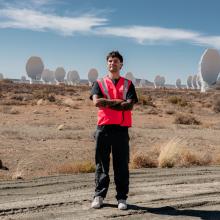Lucas Kuhn
Why did you decide to pursue a graduate degree?
I chose to pursue a graduate degree in Astronomy simply because I was not finished learning. The Universe is a very big place, and it would be crazy to try to fit all of that understanding into a 4-year B.Sc. degree. A graduate degree also helps you learn to conduct research at a higher calibre than you are taught in an undergraduate degree. Within a graduate degree, you learn to think for yourself, to ask your own questions, and devise your own methods to come to your own conclusions.
Why did you decide to study at UBC?
I chose to study at UBC for my graduate studies as I had previously attended UBC for my undergraduate degree. While I normally would not recommend this sort of continuation, in my case, my supervisor, whom I had worked with in undergrad, offered me the opportunity to work on an amazing project if I chose to continue to work with them, a project that I simply could not turn down. They had just been awarded incredibly valuable time on the revolutionary James Webb Space Telescope, and it would be my job to be the first to work with this data. How could I say no?
What is it specifically, that your program offers, that attracted you?
I enjoy the research aspect of the program greatly, I think it provides a great learning experience to future academics who plan to continue research later down the line. UBC has a good diversity of experts in many sub-fields of my program, so I got to learn a lot from them through graduate-level courses and other department gatherings.
What was the best surprise about UBC or life in Vancouver?
You are really going to want to stick around for the Vancouver summers, they're pretty hard to beat.
What aspects of your life or career before now have best prepared you for your UBC graduate program?
Being a graduate student requires many skills, but communication might be the most important of all. I learned early on how to communicate my passion of the sky to others. I used to give telescope tours to my community as a teenager, and I found the skills I learned in public speaking, I still fall back on often times today.
What advice do you have for new graduate students?
Try to learn early on how to get the most out of the relationship with your supervisor. Every supervisor will have different practices when advising a student, so it is always a good practice to ask how you, as a student, can best work with them and meet their expectations (and how they can meet yours). Effective communication with your supervisor can make a big difference in your academic journey.
Learn more about Lucas's research
Galaxies are dynamic ecosystems composed of stars, gas, dust, and dark matter, and serve as fundamental laboratories for studying both cosmic evolution and the interplay between small- and large-scale physical processes. My research focuses on understanding how galaxies acquire, use, and expel gas—a process broadly described by the baryon cycle. This cycle governs how gas flows into galaxies from the intergalactic medium, fuels star formation, and is subsequently ejected by energetic feedback processes. To investigate this cycle in detail, we present a case study of the brightest cluster galaxy (BCG) in MACS 1931, a massive cool-core galaxy cluster at z=0.35. Using observations from the James Webb Space Telescope (JWST), we examine the excitation, spatial distribution, and kinematics of warm molecular gas and ionized gas phases. In particular, JWST’s unprecedented sensitivity and resolution allow us to trace a prominent tail-like structure of gas extending from the BCG into the surrounding circumgalactic medium. These observations provide new insight into how gas is redistributed within and around galaxies embedded in dense environments. By characterizing the physical conditions and motion of gas in this system, we aim to constrain key mechanisms—such as cooling, feedback, and environmental stripping—that regulate galaxy growth and evolution. Ultimately, this work contributes to a broader understanding of how galaxies like our own formed and evolved over cosmic time.

